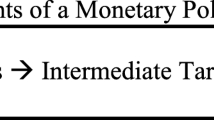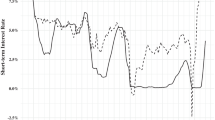Abstract
The Swiss debt brake served as a model for the new German budget rule. The two tools share the long-term goal of rendering fi scal policy sustainable by stabilising nominal debt as well as the short-term goal of smoothing the economic cycle. Debt brakes thus act as an automatic stabiliser within the economic cycle, but their effect can be impaired over the long term if government spending falls as debt is reduced.
Similar content being viewed by others
Author information
Authors and Affiliations
Corresponding author
Additional information
Karls Heinz Hausner, Federal University of Applied Administrative Sciences, Mannheim, Germany.
Silvia Simon, University of Applied Sciences HTW, Chur, Switzerland.
Rights and permissions
About this article
Cite this article
Hausner, K.H., Simon, S. Experiences with Budget Rules in Switzerland and Germany. Intereconomics 50, 99–107 (2015). https://doi.org/10.1007/s10272-015-0531-5
Published:
Issue Date:
DOI: https://doi.org/10.1007/s10272-015-0531-5




